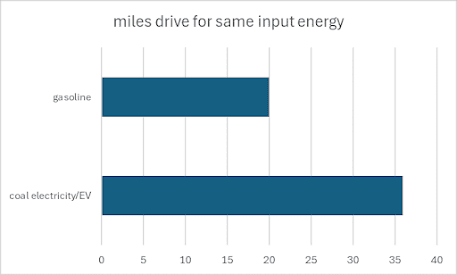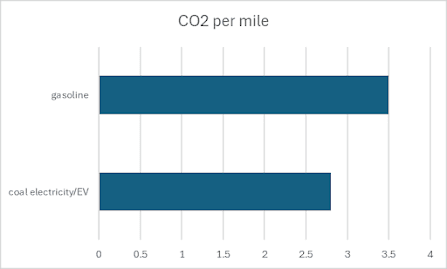Really.
Want to know why?
I can explain!
The answer is efficiency. I'm sure you've seen the memes. An EV plugged into a coal fired power plant.
Haha! Might as well burn gasoline, right? Wrong! But, but....
Here's the deal. Since the industrial revolution switched from water wheel power to steam engines, everything has been powered by "heat engines". A piston steam engine, a steam turbine, a gasoline engine, jet engine, gas turbine, diesel engine... These are all heat engines.
There's a thermodynamic/physics law that says the maximum efficiency of a heat engine is the Carnot efficiency: the ratio of the highest temperature and the lowest temperature involved in running the engine. (Carnot Efficiency = 1 - Tc/Th, c for cold h for hot) Remember, the temperature scales start at absolute zero, which is -459 F.
So, let's say we have a heat engine that uses 300 F steam and cools it to 60 F at exhaust. 1 - (60+459)/(300+459) = 32%. This means if we could create a perfect heat engine that operates between these two temperatures, the most energy we can get out is only 32% of what we put in. In practice, we are limited how close we can get to perfection by materials, the process we use (what engineers call "cycle") and losses like friction.
One more thing before we go on. When we say "heat" we are really talking about something called enthalpy. Think of it as a combo of temperature and pressure - a measure of how much energy the working substance has.
We are limited on the high end by material science. There are practical limitations on temperature and pressure using the materials at our disposal. We are limited on the bottom end by the low temperature of air, water, and land where we operate our heat engines. So, where does that leave us?
The nitty gritty. Exactly how efficient are the heat engines we use?
A coal fired steam power plant? 40% thermal efficiency.
A gasoline engine running a car at steady highway speed? 20% thermal efficiency.
Half. That's all. What? Why!?
That steam power plant runs at 1000 F, 3500 psi, and while a gasoline engine can approach this running at max RPM, wide open throttle, it's about half that for normal operation, so half the efficiency.
Some more math.... Let's compare energy use between a gas and a coal/electric car. For the coal/electric scenario, 100 units of energy go into the power plant. 40 come out to the wires. 10% of that 40 gets "lost" due to line resistance, so 36 get to the car. Battery is nearly lossless charging and discharging, so 36 goes to power the car.
For the gasoline car, 100 go into the tank, 20 come out to move car. The rest goes to heat, internal friction, and auxiliaries like the oil pump and water pump.
So, for the same energy input, the EV can go 80% farther.
Put another way, the input energy it takes to move an EV 36 miles, if electricity is from coal plant, will only moves a gasoline car 20 miles.
Now, let's talk CO2. Coal has 40% more carbon than gasoline per unit of energy. So, for the power plant, 100 of coal in gets me 100 CO2 out the stack. Gasoline, 100 energy in gets me 70 CO2 out the tailpipe. Plug and chug...
100 CO2/36 miles = 2.8 CO2/mile for coal/EV combo
70 CO2/20 miles = 3.5 CO2/mile for gasoline car.
My coal-fired EV goes 80% farther and emits 20% less carbon per mile!
Let's add in one more thing. Regenerate braking. I have some stats that show in suburban Atlanta driving, about half the energy it takes to propel the car is recoverable when braking. That is, instead of burning off kinetic energy with brakes, an EV can use the motors as generators and put that energy back into the battery.
So, half the energy it takes to move me 36 miles is recovered when I stop, enough to move me another 18 miles. Plug and chug...
54 miles vs. 20 miles.
100 CO2/54 miles = 1.9/mi
70 Co2/20 miles =3.5/MI
270% farther with 46% less CO2/mi.
But, what about cost? Okay.
A typical EV goes 3 miles on a KW-HR of electricity. At home, that costs about 12 cents. That's 4 cents a mile.
A typical gasoline car gets 25 mpg. At $3/gallon, that's $0.12/mile.
Over 20,000 miles, the EV saves you $1,600 per year in "fuel". But, EVs cost more to buy, right? Yes, for similar sized SUVs, the EV costs $14k more, After the $7500 US rebate, the net is about $7000, so simple payback is about 4 years.
But, if all of this is so, why didn't we have EVs decades ago? The simple answer is technology. There are two and two half big pieces I see.
One is battery energy density. Lithium Ion batteries are currently the top of the heap and have just enough energy density by size and weight to make a practical car. It's only been a bit over a decade that practical batteries have been doable. Note, that we are nowhere near the end of battery evolution. It seem that about once a month there is news about battery chemistry advancement.
Two is high power solid state invertors that can turn battery DC voltage into variable frequency AC to power the motors. These two pieces are the key. We don't have these, we don't have EVs. These were developed and matured in the 1990s and early 2000s and are in just about everything these days from phone chargers to locomotives.
One "half piece" is rare earth magnets for the permanent magnet motors. These make small, high torque, high power motors possible. There are alternatives, but these really make things simpler and easier. Rare earth magnets are pretty cheap these days-you even see them replacing pins and hasps in cheap jewelry.
The other "half piece" is computer power. The complexity of EVs is in the computers and software that control the battery and propulsion. Fast, powerful computing makes them run well.
There are many other factors that need to be considered to get the whole picture of EVs vs gasoline, but most of these, like mechanical simplicity, battery technology growth and longevity tilt in the favor of the EV and require a better treatment than just this post.
Energy is the big one. EVs have won that game already. The conversion will happen. The only question is how fast. The government is subsidizing the conversion speed to try to meet climate goals, but even without them, the conversion will occur.




No comments:
Post a Comment
Your turn!